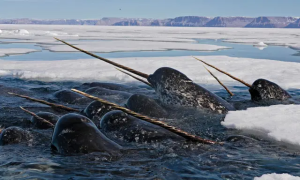The UK government Department for Environment, Food and Rural Affairs (Defra) is to extend its ban on the import and trade of elephant ivory to five other animals.

The teeth and horns of hippos, sperm whales, narwhals, orcas and walruses are soon likely to be included in the Ivory Act 2018, following a recent consultation among UK ministers to further tighten the law.
Ministers expressed concern that hippos and other aquatic mammals will be now targeted to fill an illegal poaching void created by the stricter control of elephant ivory. Under the 2018 act, trading in elephant ivory carries an unlimited fine or a prison sentence of up to five years. The new extension must now be voted through in parliament.
The 2018 act, which came into effect on June 6, 2022, prohibits dealing in objects containing elephant ivory, with a few key exceptions. This includes items made before 1918 that are of “outstandingly high artistic, cultural or historical value”.
Full guidance can be found here.
The ban has been described as the “toughest of its kind” in Europe by the UK’s biodiversity minister Trudy Harrison. “By extending greater legal protections to five more species, we are sending a clear message the commercial trade of ivory is totally unacceptable,” she says in a statement.
But while welcomed by environmentalists and vast swathes of the public, ivory bans have been criticised by antique dealers who trade in items containing the material. They argue that wide restrictions are not only detrimental to their business, but that there is little evidence to suggest the antique ivory trade contributes to modern-day poaching.
In 2019, a group of dealers unsuccessfully attempted to overturn the 2018 act in London’s Royal Courts of Justice. Prior to the ban, worked ivory items produced before 1947 could be traded within the UK, as could items produced after 1947 that have government certificates. Most reputable dealers exclusively trade in worked ivory made before 1947.
The expected extension of the 2018 act to these five animals is of particular concern for dealers in antique scrimshaw – intricate carvings done by sailors in the 18th and 19th century on the teeth and bones of whales and walruses.
“I never thought they would do it. This will destroy my business,” says David Bond, the owner of Bonds Nautical Antiques in Dartmouth – one of the UK’s largest scrimshaw dealerships.
Bond, who asserts that he is totally “anti-poaching and against the killing of whales”, says that both the 2018 act and its expected extension will do little to curb the slaughter of the animals they are designed to protect. “Whale teeth are a totally different argument to elephant tusks. Ivory is not why they are killed, historically or now”.
Any new whale ivory that comes on the market is typically from countries such as Norway, Russia and Japan, he explains, and has little to do with the trade of antique scrimshaw. “They are going at this from completely the wrong angle.”
